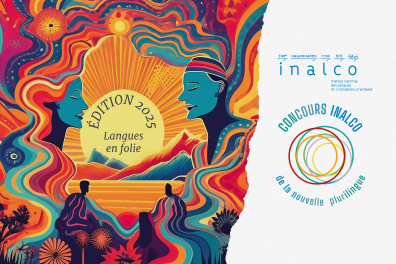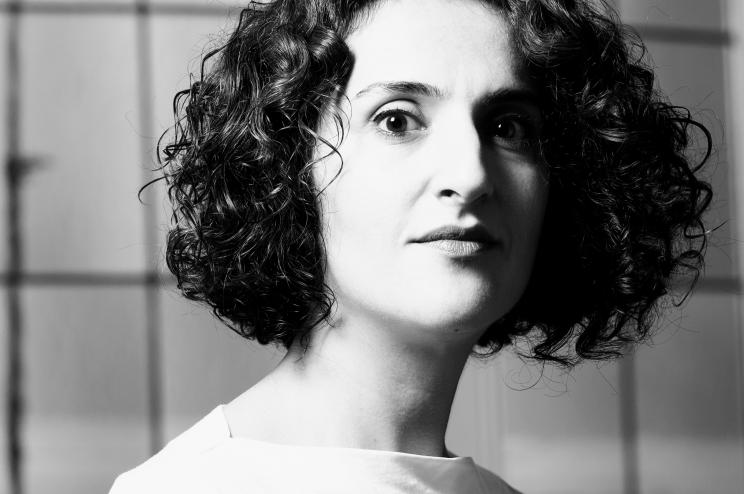Enter the Inalco Multilingual Short Story Competition until March 21, 2025
Menu Campus life
The Multilingual Short Story Competition is a project supported by Inalco's Student Success Department, with the collaboration of Aix-Marseille University's InCIAM and the partnership of École Estienne. It is open to all French-speaking students and rewards unpublished multilingual short stories and a work of multilingual digital literature.

THEME 2025 : Langues en folie
The text (short narrative of 8,000 to 15,000 characters) must be written in French, but will necessarily involve, even occasionally, a language other than standard French. All languages and linguistic varieties are accepted. Fabricated and invented languages are permitted.
Timetable
- Until March 21, 2025 at 11:59 pm (Paris time): submission of the short story or digital work online
- May 12, 2025: announcement of results and award ceremony at Inalco (Paris)
- 2025-2026: publication of short stories by Éditions Tangentielles
Sponsors of the competition
Writer Maryam Madjidi, sponsor of the 5th edition of the competition
I'm delighted and honored to be the patron of the latest edition of Inalco's multilingual short story competition.
Maryam Madjidi, godmother of the 2025 edition of the competition
In my head, two languages live and respond to each other: Persian and French. Their relationship hasn't always been simple or harmonious. One faded away while the other dominated, one was silent while the other shouted victory, myself torn in an impossible choice leading almost to madness. "Langues en folie" is therefore a theme that resonates deeply with me. I see in it the creative freedom and liberating madness of languages. Languages are not easily tamed, they don't allow themselves to be confined by fixed boundaries or normative, academic frameworks. Languages will always go further than all our rational conceptions: that's their power.
May freedom guide the language of every participant⸱e!

Maryam Madjidi was born in Tehran in 1980, and moved to Paris and Drancy with her parents at the age of six. She obtained a double master's degree in comparative literature and didactics of French as a foreign language at the Sorbonne.
She lived for four years in Beijing, where she taught French at the Alliance française, and for two years in Istanbul as an FLE trainer at the Institut français. Today she lives in the Paris suburbs where she teaches French to unaccompanied minors at a Red Cross social center.
From January 2023 to February 2024, she was a columnist for Humanité magazine.
She has published two novels with Nouvel Attila, Marx et la poupée (2017) and Pour que je m'aime encore (2021) and two children's books with L'Ecole des loisirs, Je m'appelle Maryam (2019) and Mon amie Zahra (2021). Marx et la poupée won the Goncourt first novel prize in 2017 and the Ouest-France Etonnants Voyageurs prize, and has been translated into 12 languages.
Artist and researcher Lilyana Petrova is patron of the Digital Artwork Prize
Lilyana Petrova is an artist-researcher and lecturer in Arts/Sciences, Techniques and Societies (ASTS) at ENSEA. She is a member of the Design-STS research group of the ETIS laboratory. Lilyana's work focuses on interdisciplinary approaches and interdisciplinarity as a field of research. She examines modes of articulation between different systems of knowledge production, and in particular disciplinary tensions in the study of cross-disciplinary issues. Since 2022, she has been Director of Studies for the Bachelor of Information Technology and Society (Human-IT) program at ENSEA, a program structured around a balance between learning engineering sciences (mathematics, physics, computer science) and human and social sciences (philosophy, art, anthropology, politics). It is committed to the introduction of sensitive, non-quantitative approaches in engineering teaching and research.
How to enter:
This international competition is open to all French-speaking students enrolled in a university establishment for the 2024-2025 academic year in France, the French-speaking world and beyond.
Two options are available for entering:
- Individual short story in classic text format: a short story written in French but necessarily involving, even punctually, one or more other languages than standard French.
- Possibly collective digital work ("digital writing" prize): for multilingual digital texts, playing on the multimodality offered by technological supports.
To take part, you need to submit your short story online before March 21, 2025, 11:59 pm (Paris time).
Consult the submission procedures and writing constraints on the competition website.
Four prizes up for grabs
- 1st prize: €500
- 2nd prize: €200
- 3rd prize: €100
- "Digital writing" prize: €400 + promotion and distribution of the work online and in the Editions Tangentielles book, as well as at various events linked to the competition
A Grand Jury Coup de Coeur is possible, with a purely honorary dimension, and no financial reward.
The short stories selected (as chosen by the jury) will also be published by Editions Tangentielles, and their authors will be invited to take part in a writing workshop led by the competition sponsor or another speaker specializing in writing.
Composition of the jury
The jury, made up of Inalco members with diverse backgrounds and external members, is responsible for evaluating the short stories. In addition to Inalco representatives, the jury ruling on the three best short stories will include Maryam Madjidi and the publisher of Éditions Tangentielles.

